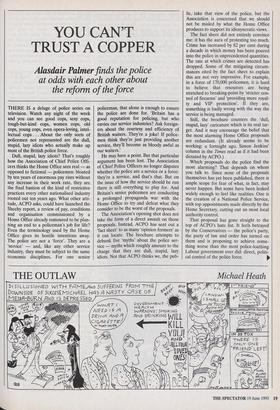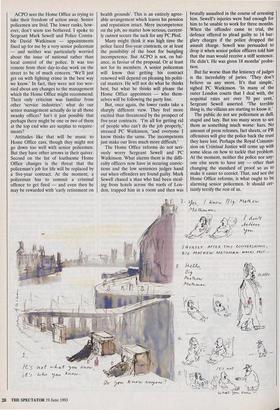YOU CAN'T TRUST A COPPER
Alasdair Palmer finds the police at odds with each other about the reform of the force
THERE IS a deluge of police series on television. Watch any night of the week and you can see good cops, sexy cops, tough-but-kind cops, women cops, old cops, young cops, even opera-loving, intel- lectual cops . . . About the only sorts of policemen not represented are the dull, stupid, lazy idiots who actually make up most of the British police force.
Dull, stupid, lazy idiots? That's roughly how the Association of Chief Police Offi- cers thinks the Home Office sees real — as opposed to fictional — policemen: bloated by ten years of enormous pay rises without any increase in their work rate, they are the final bastion of the kind of restrictive practices every other nationalised industry rooted out ten years ago. What other atti- tude, ACPO asks, could have launched the Sheehy report, a review of pay, conditions and organisation commissioned by a Home Office already rumoured to be plan- ning an end to a policeman's job for life? Even the terminology used by the Home Office gives its hostile intentions away. The police are not a 'force'. They are a `service' — and, like any other service industry, they must be subject to the same economic disciplines. For one senior policeman, that alone is enough to ensure the police are done for. 'Britain has a good reputation for policing, but who envies our service industries? Ask foreign- ers about the courtesy and efficiency of British waiters. They're a joke! If police- men think they're just providing another service, they'll become as bloody awful as our waiters.'
He may have a point. But that particular argument has been lost. The Association of Chief Police Officers no longer disputes whether the police are a service or a force: they're a service, and that's that. But on the issue of how the service should be run there is still everything to play for. And Britain's senior policemen are conducting a prolonged propaganda war with the Home Office to try and defeat what they consider to be the worst of the proposals.
The Association's opening shot does not take the form of a direct assault on those proposals. Instead, ACPO has sent out a `fact sheet' to as many 'opinion formers' as it can locate. The brochure attempts to debunk five 'myths' about the police ser- vice — myths which roughly amount to the charge that they are dull, stupid, lazy idiots. Not that ACPO thinks we, the pub- lic, take that view of the police, but the Association is concerned that we should not be misled by what the Home Office produces to support its idiosyncratic views.
The fact sheet did not entirely convince me: it has the aura of protesting too much. Crime has increased by 82 per cent during a decade in which money has been poured into the police in unprecedented quantities. The rate at which crimes are detected has dropped. Some of the mitigating circum- stances cited by the fact sheet to explain this are not very impressive. For example, in a force of 170,000 policemen, it is hard to believe that resources are being stretched to breaking-point by 'stricter con- trol of firearms' and 'providing more royal- ty and VIP protection'. If they are, something is badly wrong with the way the service is being managed.
Still, the brochure counters the 'dull, stupid, lazy' caricature which is its real tar- get. And it may encourage the belief that the most alarming Home Office proposals are redundant. (It already seems to be working: a fortnight ago, Simon Jenkins' column in the Times read as if it had been dictated by ACPO.) Which proposals do the police find the most alarming? That depends on whom you talk to. Since none of the proposals themselves has yet been published, there is ample scope for fear of what, in fact, may never happen. But some have been leaked widely enough to feel like realities. One is the creation of a National Police Service, with top appointments made directly by the Home Secretary, cutting out an most local authority control.
That proposal has gone straight to the top of ACPO's hate list. It feels betrayed by the Conservatives — the police's party, the party of law and order has turned on them and is proposing to achieve some- thing worse than the most police-loathing Labour government ever did: direct, politi- cal control of the police force. ACPO sees the Home Office as trying to take their freedom of action away. Senior policemen are livid. The lower ranks, how- ever, don't seem too bothered. I spoke to Sergeant Mark Sewell and Police Consta- ble David Watkinson — appointments fixed up for me by a very senior policeman — and neither was particularly worried about the issue of national rather than local control of the police. It was too remote from their day-to-day work on the street to be of much concern. 'We'll just get on with fighting crime in the best way we know.' In fact, they were not too wor- ried about any changes to the management which the Home Office might recommend. Their only criticism was familiar from other 'service industries': what do our senior management actually do in all those swanky offices? Isn't it just possible that perhaps there might be one or two of them at the top end who are surplus to require- ments?
Attitudes like that will be music to Home Office ears, though they might not go down too well with senior policemen. But they have other arrows in their quiver. Second on the list of loathsome Home Office changes is the threat that the policeman's job for life will be replaced by a five-year contract. At the moment, a policeman has to commit a criminal offence to get fired — and even then he may be rewarded with 'early retirement on health grounds'. This is an entirely agree- able arrangement which leaves his pension and reputation intact. Mere incompetence on the job, no matter how serious, current- ly cannot secure the sack for any PC Plod.
Many might think it was high time the police faced five-year contracts, or at least the possibility of the boot for bungling incompetence. But ACPO is not, on bal- ance, in favour of the proposal. Or at least not for its members. A senior policeman will know that getting his contract renewed will depend on pleasing his politi- cal masters. He will not do what he thinks best, but what he thinks will please the Home Office appointees — who them- selves will be following the party line.
But, once again, the lower ranks take a sharply different view. They feel more excited than threatened by the prospect of five-year contracts. 'I'm all for getting rid of people who can't do the job properly,' stressed PC Watkinson, 'and everyone I know thinks the same. The incompetents just make our lives much more difficult.'
The Home Office reforms do not seri- ously worry Sergeant Sewell and PC Watkinson. What alarms them is the diffi- culty officers now have in securing convic- tions and the low sentences judges hand out when offenders are found guilty. Mark Sewell chased a than who had been steal- ing from hotels across the roofs of Lon- don, trapped him in a room and then was brutally assaulted in the course of arresting him. Sewell's injuries were bad enough for him to be unable to work for three months. When the offender came to trial, the defence offered to plead guilty to 14 bur- glary charges if the police dropped the assault charge. Sewell was persuaded to drop it when senior police officers told him that the man would receive a stiff sentence. He didn't. He was given 18 months' proba- tion.
But far worse than the leniency of judges is the incredulity of juries. 'They don't believe us any more. It's that simple,' sighed PC Watkinson. 'In many of the outer London courts that I deal with, the acquittal rates are over 70 per cent,' Sergeant Sewell asserted. The terrible thing is, the villains are starting to know it.'
The public do not see policemen as dull, stupid and lazy. But too many seem to see them as something much worse: liars. No amount of press releases, fact sheets, or PR offensives will give the police back the trust they have lost. Perhaps the Royal Commis- sion on Criminal Justice will come up with some ideas on how to tackle that problem. At the moment, neither the police nor any- one else seem to have any — other than changing the standard of proof so as to make it easier to convict. That, and not the Home Office reforms, is what ought to be alarming senior policemen. It should cer- tainly terrify the rest of us.



















































 Previous page
Previous page